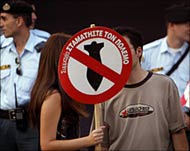European Social Forum looks east
From all over Europe they came, idealists, activists, dreamers and revolutionaries, but their sights were set on events in the Middle East.

Iraq and Palestine dominated debate among the 50,000 delegates at the European Social Forum (ESF) in Paris, as the gathering spontaneously caught fire on its second day.
“This forum is creating a space for the Palestinian narrative that is not available in the mainstream,” the Palestinian civil society spokesman Mustafa Barghouti told AlJazeera.net.
“With the efforts of the ESF to re-energize it, the international solidarity movement will soon regain its momentum.”
The forum, which is fast becoming the global protest movement’s collective think tank, saw hundreds of delegates queuing in the road, unable to get into packed meetings on the Palestinian struggle.
|
“This is a crucial moment in our history and we need your presence on every check-point” Mustafa Barghouti |
In one, Barghouti told a rapt audience that the Intifada was taking on a new urgency because the Separation Wall and settlement expansions were imperilling the possibility of an independent Palestinian state.
“This is not just another year in the history of the Israeli-Palestinian conflict or a ‘lets come back and discuss it next year’ situation,” he implored. “This is a crucial moment in our history and we need your presence on every check-point”.
The futuristic La Villette conference hall may be a world away from the streets of Ramallah, but it was through the ESF that Barghouti’s proposal for the recent November 9th day of action against the Separation Wall was organised.
This year’s debates, and the links that activists make here, will almost certainly inspire more such actions, and more campaigners to make the journey to the occupied territories.
In the next week though, thousands of Europeans at the forum are first booking their places on coaches to London for a state visit by President Bush.
 |
|
Anti-war protestors inLondon |
With up to 100,000 protestors expected to jam the capital’s streets, the demonstration is fast becoming a trial of strength for the British – and European – anti-war movements.
After initially declaring a London-wide exclusion zone, under pressure from US security services, the British authorities have now agreed to allow the protest, which includes the toppling of an 18ft high statue of Bush, to take place in Trafalgar Square.
But protestors will still be barred from Westminster Bridge, Parliament Square and Whitehall.
Stop the War Coalition spokesman John Rees told Al Jazeera.net that demonstrators would not accept such restrictions. “It is in the best interests of public order that an effective demonstration is allowed to take place,” he said. “The current impasse between our groups and the police is the government’s fault.”
 |
|
Activists are frustrated at the |
Rees later told a meeting that the anti-war message would be pressed home to Bush “with enormous force” next Thursday. Anti-war activists may hope London’s notoriously fickle skies stay clear on the day.
But while the continuing Iraqi resistance and ‘Vietnamisation’ affecting US forces enthused most delegates, some American activists were frustrated that they had been unable stop the conflict.
“We could mobilise hundreds of thousands in New York before the war started,” one complained, “but at the last protest there were barely 20,000.”
“Our movement was unique because it was pre-emptive,” another agreed. “We took a huge hit to our morale when the war started and we want to know how we can keep the momentum going now.” The consensus, eventually, was that the battle would be a long one.
“With every bomb that is dropped on my country, my heart leaks blood,” an Iraqi delegate told the hall. “I ask you to support the Iraqi people in uniting to save Iraq.”
|
“With every bomb that is dropped on my country, my heart leaks blood. I ask you to support the Iraqi people in uniting to save Iraq” Iraqi delegate |
Meanwhile, the activists streamed by outside on their way to workshops that ranged from ‘Muslims, Socialists and the anti-war movement: an unholy alliance?’ to ‘Sharing alphabets’ to ‘Can a healthy model of society emerge from a society mainly made up of neurotic people?’
Some found the wildly diverse mix of dissent and debate inspiring, others looked bewildered. All were intoxicated by the brew.
Significantly, the gnarly ‘reform versus revolution’ question that has vexed dissidents for centuries began to emerge from the shadows of past forums into open debate. The issue was posed in terms of ‘taking power’ or becoming a ‘counter-power’
At the ‘Perspectives for the anti-globalisation movement’ debate, Chris Nineham of Globalise Resistance and the UK’s Socialist Workers Party said the time was right to begin discussing the issue of state power.
“Neo-liberalism is now so discredited that we can start to talk about strikes for nationalisation,” he said, “but we have to go further and begin discussing new and more democratic models of organising the workplace that are rooted in struggle. ”
However, Pierre Khalfa of the French group ATTAC warned that the ESF had traditionally been a space for debate and abandoning that position could be divisive. “We don’t intend to occupy power and this enables us to have a space in civil society. If we try to take power we will cause a rift within ourselves.”
Another Europe may indeed be possible, as the ESF slogan says, but what it might look like is still being fought out in the bars, cafes and conference centres of northern Paris.